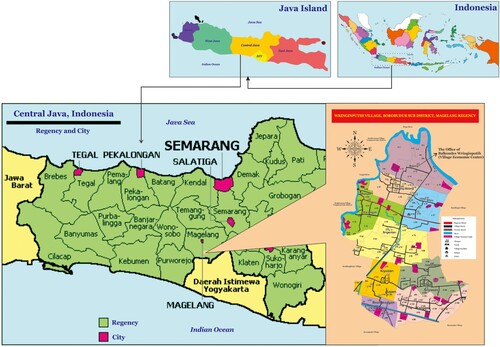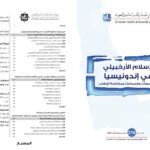Ecotourism has emerged as a powerful strategy for promoting sustainable livelihoods and enhancing the socio-economic development of local communities. However, despite its potential to foster positive change, ecotourism faces several challenges that can hinder its long-term success. A recent study by Ahmad Izudin, Pajar Hatma Indra Jaya, and Rahadiyand Aditya, published in the Journal of Ecotourism (Scopus Q1), offers an in-depth analysis of the role of ecotourism in local community development, with a focus on the Wringinputih tourist village in Borobudur, Central Java, Indonesia.
Ecotourism: A Path to Sustainable Community Development
Ecotourism is not just about preserving natural resources; it’s also about promoting the welfare of local populations by integrating environmental conservation with socio-economic development. In Indonesia, where natural beauty and cultural heritage are abundant, ecotourism has become a key tool for balancing growth with sustainability. The study conducted by Izudin, Jaya, and Aditya examines how ecotourism can significantly contribute to the development of local communities, particularly in rural areas like Wringinputih.
Through a combination of observations and interviews, the researchers explored the impact of ecotourism on the village, investigating both its positive outcomes and the challenges faced in sustaining such initiatives. The findings provide valuable insights into how ecotourism can be harnessed to boost community well-being while promoting the preservation of local resources.
Benefits of Ecotourism: Strengthening Local Communities and Resource Preservation
The study reveals that ecotourism in Wringinputih has had a notable impact on the local community’s perception of openness and social connectivity. The presence of tourists has encouraged a more inclusive, ties-based community structure, where collaboration and cooperation are emphasized. This, in turn, fosters a sense of ownership and pride in preserving natural resources, which is crucial for the sustainability of ecotourism in the long term.
By providing economic opportunities through tourism-related activities, ecotourism has contributed to improving the livelihoods of the residents. It has allowed local businesses to flourish and created new employment avenues, particularly in sectors like hospitality, guiding services, and handicrafts. Furthermore, the village’s involvement in ecotourism has helped raise awareness about environmental conservation and the importance of sustainable practices.
Challenges to Ecotourism Sustainability: Corruption and Mistrust
While the benefits of ecotourism in Wringinputih are evident, the study also highlights significant challenges that hinder its effective sustainability. One of the main obstacles identified is corruption, which affects the allocation of resources for ecotourism projects. Corruption in local governance has led to inefficiencies in managing tourism revenues, which are meant to support community development and conservation efforts.
Another challenge is the lack of trust in the government, which has been a barrier to effective collaboration between local communities and authorities. This mistrust stems from a history of broken promises and unfulfilled commitments, making it difficult to establish a solid foundation for long-term development programs.
Additionally, the absence of proper ecotourism planning has been a stumbling block. The study indicates that many ecotourism initiatives in rural areas are not well-integrated into comprehensive development plans, resulting in missed opportunities for maximizing the potential of ecotourism. Without clear planning, ecotourism can become fragmented, and its benefits may not reach the entire community.
Recommendations for Enhancing Ecotourism in Local Communities
Based on the study’s findings, the authors provide several recommendations for improving the effectiveness of ecotourism initiatives in rural communities like Wringinputih. First, it is crucial to build trust between local communities and government agencies through transparent and accountable governance. This includes ensuring that resources allocated for ecotourism are used effectively and that local residents are included in the decision-making process.
Second, the study emphasizes the need for proper planning and community involvement in the development of ecotourism strategies. By involving local communities in the planning and management processes, it is possible to create ecotourism models that align with the needs and aspirations of the people. This participatory approach helps ensure that ecotourism becomes a sustainable source of income and contributes to the preservation of natural resources.
Finally, the authors stress the importance of addressing corruption and ensuring that any funds generated from ecotourism are reinvested in community development and environmental conservation.
Conclusion: A Path Forward for Ecotourism in Indonesia
Ecotourism has proven to be a valuable tool for promoting sustainable community development in Indonesia, offering a means of economic growth while preserving the environment. However, to unlock its full potential, it is essential to address the challenges that currently hinder its effectiveness, such as corruption, mistrust in government, and inadequate planning.
The study by Izudin, Jaya, and Aditya provides a comprehensive analysis of these issues, offering practical recommendations for improving ecotourism in Wringinputih and other rural communities across Indonesia. By fostering collaboration, ensuring transparency, and promoting community-led initiatives, ecotourism can continue to play a pivotal role in shaping a more sustainable and prosperous future for local communities in Indonesia.
For further details, you can access the full study published in the Journal of Ecotourism






